
History of Economic Thought and Policy
Scope & Guideline
Advancing Understanding of Economic Thought and Its Impact
Introduction
Aims and Scopes
- Historical Analysis of Economic Theories:
The journal emphasizes the historical development of economic thought, from classical to contemporary theories, exploring how past ideas shape current economic policies. - Interdisciplinary Approaches:
It incorporates perspectives from various disciplines, including history, political science, sociology, and philosophy, allowing for a richer understanding of economic concepts and their societal impacts. - Policy Implications of Economic Thought:
The journal highlights the relationship between economic theories and policy-making, examining how theoretical frameworks influence real-world economic decisions and strategies. - Global Perspectives on Economics:
Research published in the journal often includes a global viewpoint, analyzing economic theories and policies across different cultures and historical contexts. - Critical Examination of Economic Models:
It encourages critical discussions on established economic models, questioning their assumptions and applicability in various historical and contemporary settings.
Trending and Emerging
- Interdisciplinary Ethical Economics:
Recent publications emphasize the intersection of ethics and economics, particularly in teaching and applying economic principles, reflecting a growing concern for ethical considerations in economic decision-making. - Economic Nationalism and Globalization:
There is an emerging focus on the themes of economic nationalism and its historical contexts, particularly in relation to globalization, signaling a response to contemporary geopolitical economic shifts. - Historical Perspectives on Inequality:
The journal increasingly addresses historical perspectives on inequality, exploring how past economic policies and theories have shaped current socio-economic disparities. - Technological Innovation and Public Policy:
Research on the interplay between technological advancements and public policy is on the rise, reflecting the importance of understanding economic implications of innovation in historical contexts. - The Role of Institutions in Economic Development:
There is an expanding interest in the role of institutions in shaping economic thought and policy, indicating a trend towards understanding economics through an institutional lens.
Declining or Waning
- Traditional Marxist Analysis:
While Marxist frameworks were once a staple in economic thought discussions, recent publications indicate a decline in focus on traditional Marxist critiques, suggesting a shift towards more pluralistic economic perspectives. - Neoclassical Economics Dominance:
The historical dominance of neoclassical economics in the journal’s discourse appears to be waning, as more diverse theoretical approaches gain traction, reflecting a broader range of economic thought. - Purely Theoretical Economic Models:
There seems to be a decreasing emphasis on purely theoretical economic models without historical context, as the journal increasingly values empirical and historical analyses of economic phenomena. - Focus on Specific National Economies:
The journal's previous concentration on specific national economic histories is declining, with a growing trend towards comparative and global economic histories instead.
Similar Journals
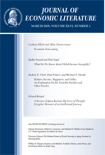
JOURNAL OF ECONOMIC LITERATURE
Illuminating the landscape of economic scholarship.JOURNAL OF ECONOMIC LITERATURE, published by the American Economic Association, stands as a premier academic journal in the field of economics, with a notable Q1 classification in Economics and Econometrics for 2023. Operating from its base in Nashville, TN, this journal has established itself as an indispensable resource for economic researchers and practitioners alike, boasting an impressive Scopus ranking of 10 out of 716—placing it in the top 2% of its category. The journal's commitment to providing comprehensive critical surveys of the literature enhances the understanding of various economic topics, making it a vital tool for researchers seeking to deepen their knowledge or explore new areas of inquiry. Although it operates on a subscription basis, the journal’s high impact on the economics community underlines its importance in advancing the field. With coverage spanning from the 1980s to the present, JOURNAL OF ECONOMIC LITERATURE continues to encourage rigorous scholarship and bridge theoretical and empirical research, enabling informed discourse among economists globally.
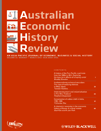
AUSTRALIAN ECONOMIC HISTORY REVIEW
Bridging History and Economics for Informed Analysis.The Australian Economic History Review, published by Wiley, is a premier journal dedicated to advancing the field of economic history through rigorous research and insightful analyses. With an ISSN of 0004-8992 and an E-ISSN of 1467-8446, this journal has established itself as a critical resource for scholars and practitioners alike, with a notable Scopus ranking that places it in the 85th percentile among History journals and provides a complementary perspective in Economics and Econometrics fields. Since its inception in 1974, it has provided a platform for innovative research, fostering discussions that span Australian economic developments and their global contexts. Although it offers limited Open Access options, the journal remains a vital source of information for those seeking to understand the intricate dynamics of economic processes through historical lenses. Researchers, professionals, and students are encouraged to engage with the rich content that contributes significantly to both academic scholarship and practical implications in economic historiography.
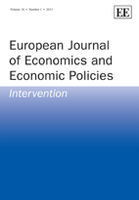
European Journal of Economics and Economic Policies-Intervention
Fostering dialogue that influences economic interventions across Europe.European Journal of Economics and Economic Policies-Intervention is a leading academic journal published by Edward Elgar Publishing Ltd, focusing on the intersection of economics and policy-making. Established in 2004 and set to continue through 2024, the journal is dedicated to fostering innovative research and providing a platform for interdisciplinary dialogue within the realms of economics and finance. With an H-index that reflects citation impact, it is indexed in Scopus, showcasing a respectable rank in both Economics and Econometrics, as well as Finance, categorizing it in the Q3 quartile. This journal targets a diverse readership, including researchers, professionals, and students, offering valuable insights and findings that shape economic thought and policy across Europe and beyond. While the journal operates under a subscription model, it remains committed to delivering high-quality scholarship that contributes significantly to the fields of economics and economic policies. As it continues to grow in influence, European Journal of Economics and Economic Policies-Intervention stands out as a vital resource for those seeking to understand and impact economic interventions in a rapidly evolving landscape.

ATLANTIC ECONOMIC JOURNAL
Connecting Theory with Real-World ApplicationWelcome to the Atlantic Economic Journal, an esteemed publication in the field of economics, econometrics, and finance, published by Springer. With its inception dating back to 1973 and a significant publication history extending to 2024, this journal has continuously contributed to the discourse on economic theory, policy, and practice. The journal holds a Q3 rank in the latest category quartiles of 2023, showcasing its relevance within the competitive landscape of economic research. Though it does not offer open access options, readers and contributors can expect rigorous peer-reviewed articles that enhance their understanding of economic phenomena and analytical methods. The journal is indexed in Scopus, where it ranks #154 out of 288 in the general economics category, placing it in the 46th percentile. The Atlantic Economic Journal is not just a resource but a platform facilitating the engagement of researchers, professionals, and students in critical economic discussions, furthering knowledge and innovation in the field.
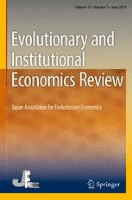
Evolutionary and Institutional Economics Review
Bridging Theory and Practice in Economic EvolutionThe Evolutionary and Institutional Economics Review, published by SPRINGER HEIDELBERG, serves as a pivotal platform for disseminating cutting-edge research in the dynamic fields of evolutionary and institutional economics. With its ISSN 1349-4961 and E-ISSN 2188-2096, this journal emphasizes interdisciplinary approaches that explore how economic institutions evolve and impact economic performance and social welfare. Although currently not open access, it provides invaluable insights for researchers, professionals, and students keen on understanding the intricate relationships between economic systems and institutional frameworks. The journal aims to foster academic discourse that bridges theoretical perspectives and practical implications, enhancing the scholarly conversation within the economic community. Its headquarters in Heidelberg, Germany, positions it at the heart of European economic research, making it an essential resource for anyone interested in the evolution of economic thought.

Econ Journal Watch
Pioneering Research for a Deeper Understanding of Economics.Econ Journal Watch is an esteemed scholarly publication dedicated to advancing the field of economics through critical analysis and discourse. Established by the Institute for Spontaneous Order Economics, this journal aims to provide a platform for researchers, professionals, and students to examine and reflect on contemporary economic issues and theories. With an ISSN of 1933-527X and an E-ISSN of 1933-527X, it has positioned itself within the competitive realm of economics and econometrics. As part of the Q4 category in the 2023 rankings for Economics and Econometrics, the journal is indexed on Scopus, ranking at #569 out of 716 institutions, placing it within the 20th percentile. Although it currently maintains a non-Open Access model, it offers valuable insights and rigorous analysis from 2008 to 2024, contributing significantly to the discourse in economics. The journal’s commitment to fostering a deeper understanding of economic principles makes it an essential resource for anyone engaged in the economic field.
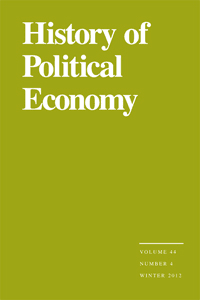
HISTORY OF POLITICAL ECONOMY
Decoding the Historical Narratives of Economic PoliciesHISTORY OF POLITICAL ECONOMY, published by DUKE UNIVERSITY PRESS, stands as a premier journal in the interdisciplinary fields of political economy and history. With an ISSN of 0018-2702 and an E-ISSN of 1527-1919, the journal provides a platform for rigorous scholarship that spans from its converged years beginning in 1986 to the present, aiming to elucidate the complex interplay between economic policies and historical contexts. It holds impressive rankings, peaking in the Q1 category for History and Q2 in Economics and Econometrics as of 2023, showcasing its impact and prestige in the scholarly community. Notably, it is ranked within the 88th percentile in Arts and Humanities History and maintains a significant presence in the 24th percentile for Economics and Econometrics. Although it does not currently offer open access, the journal remains committed to advancing knowledge and fostering thoughtful discourse among researchers, professionals, and students alike. Located in Durham, NC, the journal is dedicated to exploring the rich historical narratives that have shaped economic thought and policy, making it an essential read for those seeking to navigate the intricate landscape of political economy.
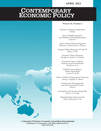
CONTEMPORARY ECONOMIC POLICY
Innovative Insights into Contemporary Economic ChallengesCONTEMPORARY ECONOMIC POLICY is an esteemed journal dedicated to advancing the discourse in the realms of economics, public administration, and management. Published by Wiley, this influential journal has been contributing to the field since 1982 and continues to provide valuable insights and research findings through its rigorous peer-review process. With a commendable impact factor placing it in the Q2 category across multiple fields—including Business, Management, and Accounting, as well as Economics and Econometrics—CONTEMPORARY ECONOMIC POLICY is positioned as a vital resource for scholars, practitioners, and students alike. The journal not only fosters academic collaboration but also addresses pressing economic policies and practices impacting the global landscape. Researchers and professionals can benefit from a subscription-based access model, ensuring they remain at the forefront of current economic debates and innovations.

Oeconomia-History Methodology Philosophy
Navigating the Confluence of Thought and InquiryOeconomia-History Methodology Philosophy, published by ASSOC OECONOMIA, is a distinguished academic journal focused on the interdisciplinary study of economics, history, methodology, and philosophy. With its ISSN 2113-5207 and E-ISSN 2269-8450, this Open Access journal has been committed to disseminating high-quality research since 2011, enabling widespread accessibility to its content. Based in Paris, France, the journal holds impressive rankings, including a Q1 quartile in History and a Q3 quartile in both Economics, Econometrics and Finance, as well as Sociology and Political Science for 2023. This diversity highlights its multifaceted approach to understanding complex societal issues. With significant visibility in leading databases, including Scopus, it appeals to researchers, professionals, and students alike, fostering robust discussions and innovative insights in their respective fields. The journal currently spans from 2018 to 2024, offering a platform for critical analyses and theoretical advancements that challenge established norms and encourage new perspectives.

CAMBRIDGE JOURNAL OF ECONOMICS
Driving Critical Discourse in EconomicsCambridge Journal of Economics, published by Oxford University Press, is a premier academic journal in the field of economic theory, policy, and applications, catering to researchers, professionals, and students alike. With a rich history dating back to 1977, this journal has established itself as a notable contributor to critical discourse in the arena of Economics and Econometrics. With an impressive Scopus ranking of #210 out of 716 in its category, placing it in the 70th percentile, the journal maintains a solid Q2 classification, reflecting its significant impact and contribution to the field. Although it operates on a subscription basis, the Cambridge Journal of Economics is accessible through a range of academic databases and libraries, ensuring that its high-quality research reaches a wide audience. The journal aims to advance the understanding and application of economic principles, making it an essential resource for anyone looking to deepen their knowledge or stay updated with the latest research trends in economics.